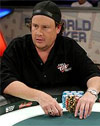
By Gavin Smith
 Most of the poker books speak of the dangers of becoming a "calling station". The common wisdom is that when you play a hand, you wager, restart or foldiez... Caller is usually considered to be the worst of things to do.
Most of the poker books speak of the dangers of becoming a "calling station". The common wisdom is that when you play a hand, you wager, restart or foldiez... Caller is usually considered to be the worst of things to do.
I do not agree. When I play No-Limit Hold'em tournaments ' em, I find several situations in which the best game's caller. A strategic call might help me lose all my money when I have a good, but second hand. Or a well-placed call will make me save more chips if I do not have the strongest hand at showdown. Watch the following a few examples and you will see that a call can sometimes be a very powerful weapon.
Suppose that you are in the middle of a tournament and you have a stack a bit at the bottom of the average. A tight player raises early position of three times the big blind. You look at your cards and you find a pair of tens. You probably do not want sunset your ten. This is probably the best hand you have had for a long time. Many people will say that in this situation, you should go there for a strong recovery.
But the recovery may be dangerous. Depending on the size of your stack, you could be committed to the pot to have other choices that caller if your opponent goes all-in. If this happens, you may be against a higher pair, or, at best, AK. You want never any risk your chips to be a small favorite or, at worst, underdog.
If, however, you call the raise, you have a much better opportunity and better will be your decision on the flop. The flop might give A-Q-7, after which you would be easy to fold against a bet, knowing full well that your hand will be very unlikely to be the best. If you see a flop as 4-4-6 and your opponent set, you can restart it. Most of the players who have only AK at this stage will fold. If your opponent goes all-in, you can be sure that your ten are not good. Guests sleep in retaining much of your stack.
In addition, if you do that caller, you can obtain much information throughout the hand. You will have the chance to see three of the five cards before committing any of your carpet. You also force your opponent to react to the flop. His reaction a update or a check will surely help you to know if your hand is in advance or underdog.
Here is another situation where the pre-flop call has several advantages. Let's say you are in late position with a pair of 7 and a player in middle position raises. For the purposes of the example, assume that villain has a pair of jacks. The flop falls A-K-4. It is almost impossible for the player with his pair of jacks on the flop. A good percentage of the time, this player goes checker the flop. When this happens, you can bet to represent an ACE, update that will likely be ugly folder. You will have won a pot in outclassing your opponent. There's no better feeling in poker.
There are several situations where the call is that it is better to do. I've presented only a few trivial examples, but I would like to draw a conclusion from all this. Many beginners are most of their pre-flop action. With any decent hand they revive and reraised or go all-in. I personally believe that play after the flop brings new as opportunities to make sunset your opponent who has a better hand, place good bluffs, things that are impossible pre-flop. Play post-flop is also much more pleasant. In your next tournament, try caller in some places where normally you would have revived. I believe that you will enjoy the experience.
 Most of the poker books speak of the dangers of becoming a "calling station". The common wisdom is that when you play a hand, you wager, restart or foldiez... Caller is usually considered to be the worst of things to do.
Most of the poker books speak of the dangers of becoming a "calling station". The common wisdom is that when you play a hand, you wager, restart or foldiez... Caller is usually considered to be the worst of things to do.I do not agree. When I play No-Limit Hold'em tournaments ' em, I find several situations in which the best game's caller. A strategic call might help me lose all my money when I have a good, but second hand. Or a well-placed call will make me save more chips if I do not have the strongest hand at showdown. Watch the following a few examples and you will see that a call can sometimes be a very powerful weapon.
Suppose that you are in the middle of a tournament and you have a stack a bit at the bottom of the average. A tight player raises early position of three times the big blind. You look at your cards and you find a pair of tens. You probably do not want sunset your ten. This is probably the best hand you have had for a long time. Many people will say that in this situation, you should go there for a strong recovery.
But the recovery may be dangerous. Depending on the size of your stack, you could be committed to the pot to have other choices that caller if your opponent goes all-in. If this happens, you may be against a higher pair, or, at best, AK. You want never any risk your chips to be a small favorite or, at worst, underdog.
If, however, you call the raise, you have a much better opportunity and better will be your decision on the flop. The flop might give A-Q-7, after which you would be easy to fold against a bet, knowing full well that your hand will be very unlikely to be the best. If you see a flop as 4-4-6 and your opponent set, you can restart it. Most of the players who have only AK at this stage will fold. If your opponent goes all-in, you can be sure that your ten are not good. Guests sleep in retaining much of your stack.
In addition, if you do that caller, you can obtain much information throughout the hand. You will have the chance to see three of the five cards before committing any of your carpet. You also force your opponent to react to the flop. His reaction a update or a check will surely help you to know if your hand is in advance or underdog.
Here is another situation where the pre-flop call has several advantages. Let's say you are in late position with a pair of 7 and a player in middle position raises. For the purposes of the example, assume that villain has a pair of jacks. The flop falls A-K-4. It is almost impossible for the player with his pair of jacks on the flop. A good percentage of the time, this player goes checker the flop. When this happens, you can bet to represent an ACE, update that will likely be ugly folder. You will have won a pot in outclassing your opponent. There's no better feeling in poker.
There are several situations where the call is that it is better to do. I've presented only a few trivial examples, but I would like to draw a conclusion from all this. Many beginners are most of their pre-flop action. With any decent hand they revive and reraised or go all-in. I personally believe that play after the flop brings new as opportunities to make sunset your opponent who has a better hand, place good bluffs, things that are impossible pre-flop. Play post-flop is also much more pleasant. In your next tournament, try caller in some places where normally you would have revived. I believe that you will enjoy the experience.




